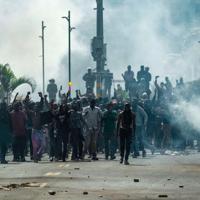Nairobi
Kenya was in a state of shock on Wednesday after unprecedented protests against proposed tax hikes turned deadly, partially gutted and destroyed Parliament building, prompting President William Ruto's government to deploy the military.
“Deaths, Chaos,” read the Standard's front page headline, while the Daily Nation described the situation as “chaos” and said “the country has been shaken to its very foundations.”
The largely youth-led rallies began largely peacefully last week, with thousands of protesters marching in the capital, Nairobi, and across the country in opposition to the tax hikes.
But tensions escalated sharply on Tuesday afternoon after police fired live ammunition at crowds who then ransacked the parliament building, with human rights groups reporting that five people were killed and more than 30 were injured in the violence.
Hours later, Defense Minister Aden Bare Douale announced that the government was deploying the military to help police deal with a “security emergency” in the country.
At a late-night press conference, Prime Minister Ruto likened some of the protesters to “criminals” and warned that the government would take a tough stance against “violence and anarchy”.
“It is not only disruptive but inconceivable that criminals under the guise of peaceful protest can sow fear into the people, their elected representatives and our constitutional institutions with impunity,” he said.
The government has been surprised by the intensity of the opposition to the proposed tax reforms, which has been led mainly by young Kenyans, Generation Z, and culminated in shocking scenes broadcast live on television in Parliament.
After the crowd broke through barricades, footage released by local television stations showed buildings ransacked, furniture burned and windows smashed.
As police opened fire on angry crowds, leaving several bodies strewn on the ground, protest organizers urged people to walk home together and “stay safe.”
'Insanity'
An AFP reporter said a large police presence was present around the parliament building on Wednesday morning and the smell of tear gas was still in the air.
A police officer standing in front of the destroyed barricades told AFP he saw the horrific scenes unfold on television.
“It was madness. Hopefully today is calmer,” he said.
Rallies held in various Kenyan cities early Tuesday were largely peaceful.
But tensions escalated in Nairobi by the afternoon, with some protesters hurling stones at police, who then used tear gas and water cannons before firing live ammunition.
The Kenya Human Rights Commission said at least one protester was shot dead by police, and an AFP reporter saw three people lying bloody and motionless on the ground near parliament.
A joint statement from human rights groups, including the Kenya branch of Amnesty International, said police shot and killed five people.
Internet services were cut off as night fell, with global web monitoring company NetBlocks reporting “major disruptions” in Kenya but access was only restored in the evening.
'Brute force'
The unrest has alarmed the international community, with the White House calling for calm and saying more than a dozen Western countries, including Canada, Germany and Britain, were “particularly shocked by the scenes witnessed outside Kenya's parliament”.
African Union Commission Chairman Moussa Faki Mahamat expressed “deep concern” over the loss of life and called on “all parties to maintain calm and refrain from further violence.”
Veteran opposition leader Raila Odinga, who heads the Azimio Coalition, accused the government of “inflicting violence on our children”.
“Kenya cannot kill children because they want food, jobs and someone to listen,” he said.
Human rights monitors have also accused authorities of abducting protesters.
Police did not respond to AFP's requests for comment.
Cost of living
Long-standing frustration over the rising cost of living was exacerbated last week as lawmakers began debating tax increases proposed in the 2024 Finance Bill.
The cash-strapped government says it needs the increase to repay the country's huge debt of about 10 trillion shillings ($78 billion), roughly 70 percent of Kenya's GDP.
The government now intends to increase fuel prices and export taxes after withdrawing some of its controversial proposals that would have affected bread buying, car ownership, and financial and mobile services.
Kenya's finance ministry has warned of a huge budget shortfall of 200 billion shillings following Prime Minister Ruto's decision to roll back some tax increases.
Kenya is one of East Africa's most dynamic economies, but a third of its 52 million people live in poverty.



